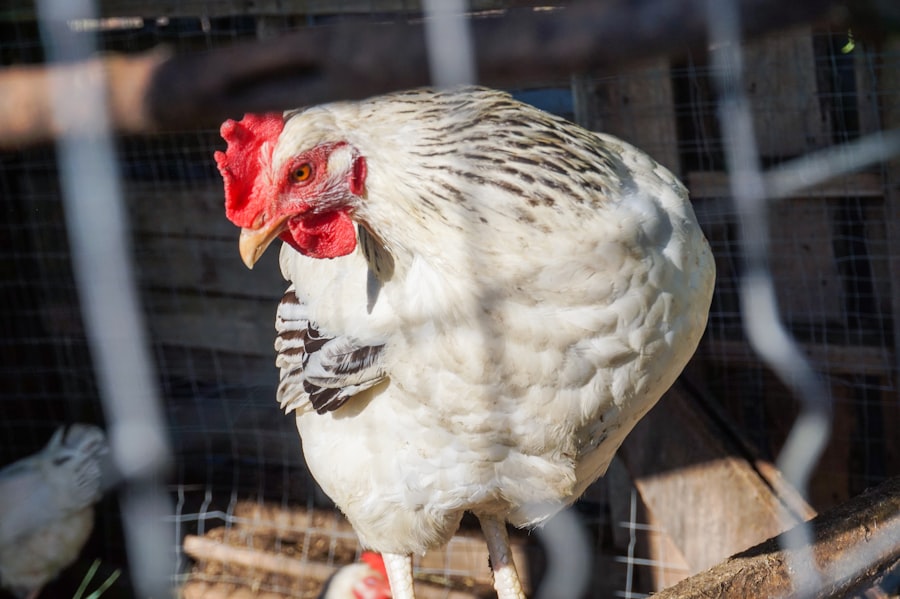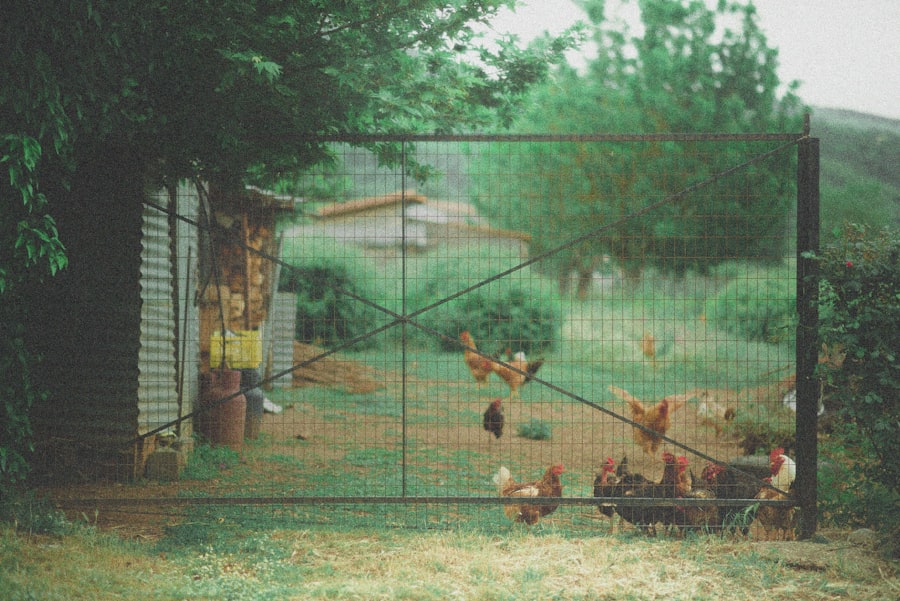Gnats are small, flying insects belonging to the order Diptera, which includes various families such as Sciaridae, Mycetophilidae, and Cecidomyiidae. They are commonly found in moist environments and can be a nuisance to both humans and animals. In chicken coops, gnats can cause stress and discomfort to the birds, potentially leading to decreased egg production and overall health issues.
Gnats are attracted to moisture, decaying organic matter, and standing water, making chicken coops an ideal habitat for these insects. They are most active during warmer months and can reproduce rapidly if not properly managed. While some gnat species may bite, causing irritation, others are primarily a nuisance due to their swarming behavior.
The presence of gnats in chicken coops can have several negative impacts:
1. Stress: Large numbers of gnats can cause stress to chickens, affecting their behavior and well-being. 2.
Respiratory issues: Chickens may inhale gnats, potentially leading to respiratory problems. 3. Disease transmission: Some gnat species can potentially transmit diseases or parasites to chickens.
4. Reduced productivity: Stressed chickens may experience decreased egg production. Chicken owners should be aware of the potential risks associated with gnat infestations and implement appropriate control measures.
These may include improving coop ventilation, reducing moisture levels, removing standing water, and using appropriate insect control methods. Regular cleaning and maintenance of the coop can also help prevent gnat populations from becoming established.
Table of Contents
- 1 Implementing Natural Repellents and Deterrents
- 2 Maintaining Cleanliness and Hygiene in the Chicken Coop
- 3 Utilizing Protective Coverings and Netting
- 4 Incorporating Essential Oils and Herbs for Gnat Control
- 5 Monitoring and Managing Moisture Levels in the Environment
- 6 Seeking Professional Advice and Consultation for Severe Infestations
- 7 FAQs
- 7.1 What are gnats and why are they a problem for chickens?
- 7.2 How can I keep gnats off my chickens?
- 7.3 Are there any natural remedies to repel gnats from chickens?
- 7.4 What are some preventive measures to avoid gnat infestations in the chicken coop?
- 7.5 Are there any commercial products available to keep gnats off chickens?
Key Takeaways
- Gnats can cause stress and discomfort for chickens, leading to decreased egg production and overall health issues.
- Natural repellents like citronella, lavender, and marigold can help deter gnats from the chicken coop.
- Regular cleaning and proper waste management are essential for preventing gnat infestations in the chicken coop.
- Protective coverings and netting can help keep gnats and other pests out of the chicken coop.
- Essential oils like eucalyptus and herbs like basil can be used to control and repel gnats in the chicken coop.
Implementing Natural Repellents and Deterrents
Natural Herbs as Gnat Repellents
One of the most effective ways to control gnats in a chicken coop is by implementing natural repellents and deterrents. Planting gnat-repelling herbs such as lavender, mint, and basil around the coop can help deter gnats from entering the area. These herbs emit strong scents that are unpleasant to gnats, making them an effective natural deterrent.
Essential Oils as Gnat Repellents
Using essential oils such as citronella, eucalyptus, and lemongrass can help repel gnats and other flying insects from the coop. These oils can be diluted with water and sprayed around the coop to create a barrier against gnats.
Diatomaceous Earth: A Natural Gnat Killer
Another natural gnat repellent that can be used in a chicken coop is diatomaceous earth. This powdery substance is made from fossilized remains of diatoms and is known for its ability to control insect pests. Diatomaceous earth works by dehydrating and killing gnats upon contact, making it an effective natural deterrent for gnat infestations. It can be sprinkled around the coop and nesting areas to create a protective barrier against gnats without posing any harm to the chickens.
By implementing natural repellents and deterrents, chicken owners can effectively control gnat infestations in their coop while ensuring the safety and well-being of their flock.
Maintaining Cleanliness and Hygiene in the Chicken Coop

Maintaining cleanliness and hygiene in the chicken coop is essential for controlling gnat infestations and preventing potential health issues for the birds. Gnats are attracted to decaying organic matter, standing water, and moist environments, making it crucial to keep the coop clean and dry at all times. Regularly cleaning the coop, removing soiled bedding, and disposing of waste material can help eliminate potential breeding grounds for gnats and other pests.
Additionally, ensuring proper ventilation and airflow in the coop can help reduce moisture levels and discourage gnat infestations. Proper waste management is also important in maintaining cleanliness and hygiene in the chicken coop. Keeping feeders and waterers clean and free from spills can help prevent the accumulation of organic matter that attracts gnats.
Using feeders with covers and placing waterers on elevated stands can also help reduce the risk of gnat infestations by minimizing access to food and water sources for the insects. By maintaining cleanliness and hygiene in the chicken coop, chicken owners can create an environment that is less attractive to gnats and other pests, ultimately promoting the health and well-being of their flock.
Utilizing Protective Coverings and Netting
Utilizing protective coverings and netting in and around the chicken coop can help prevent gnat infestations and protect the birds from irritating bites. Installing screens on windows and vents can help prevent gnats from entering the coop while allowing for proper airflow and ventilation. Additionally, using fine mesh netting around outdoor areas where chickens roam can help create a barrier against gnats and other flying insects.
This can be particularly beneficial during peak gnat seasons when the insects are most active. Protective coverings such as tarps or plastic sheeting can also be used to create a barrier against gnats in outdoor areas where chickens spend time. By covering areas with these materials, chicken owners can create a protective barrier against gnats while still allowing for adequate airflow and natural light.
Utilizing protective coverings and netting is an effective way to prevent gnat infestations in and around the chicken coop while ensuring the comfort and well-being of the birds.
Incorporating Essential Oils and Herbs for Gnat Control
Incorporating essential oils and herbs for gnat control is a natural and effective way to repel gnats from the chicken coop. Essential oils such as citronella, eucalyptus, lemongrass, and lavender are known for their ability to repel gnats and other flying insects. These oils can be diluted with water and sprayed around the coop to create a protective barrier against gnats without posing any harm to the chickens.
Additionally, planting gnat-repelling herbs such as mint, basil, and rosemary around the coop can help deter gnats from entering the area. Using essential oils in diffusers or oil burners inside the coop can also help repel gnats while creating a pleasant aroma for the birds. This method not only helps control gnat infestations but also promotes a calming environment for the chickens.
By incorporating essential oils and herbs for gnat control, chicken owners can effectively repel gnats from the coop while promoting the health and well-being of their flock in a natural and non-toxic manner.
Monitoring and Managing Moisture Levels in the Environment

Preventing Standing Water
Regularly checking for leaks, repairing any damaged roofing or plumbing, and ensuring proper drainage around the coop can help prevent standing water that attracts gnats.
Absorbing Excess Moisture
Using absorbent bedding materials such as straw or wood shavings can help absorb excess moisture in the coop, reducing the risk of gnat infestations. Proper ventilation is also important in managing moisture levels in the chicken coop.
Improving Air Circulation
Installing fans or vents can help improve air circulation and reduce moisture buildup, ultimately creating an environment that is less conducive to gnat infestations. By monitoring and managing moisture levels in the environment, chicken owners can effectively control gnat infestations in their coop while promoting a healthy and comfortable environment for their flock.
Seeking Professional Advice and Consultation for Severe Infestations
In some cases of severe gnat infestations, seeking professional advice and consultation may be necessary to effectively control the problem. Pest control experts or agricultural extension services can provide valuable insight into managing gnat infestations in a chicken coop. These professionals can assess the severity of the infestation, identify potential breeding grounds for gnats, and recommend appropriate control measures based on the specific needs of the coop.
Professional consultation may also involve implementing targeted pest control methods such as biological controls or insecticides that are safe for use around chickens. These methods should be used with caution and under professional guidance to ensure the safety of the birds and the environment. By seeking professional advice and consultation for severe gnat infestations, chicken owners can effectively address the problem while minimizing potential risks to their flock.
In conclusion, understanding gnats and their impact on chickens is crucial for developing effective strategies for gnat control and prevention. Implementing natural repellents and deterrents, maintaining cleanliness and hygiene in the chicken coop, utilizing protective coverings and netting, incorporating essential oils and herbs for gnat control, monitoring and managing moisture levels in the environment, and seeking professional advice for severe infestations are all important steps in controlling gnat infestations in a chicken coop. By taking proactive measures to address gnat infestations, chicken owners can create a healthy and comfortable environment for their flock while promoting their overall well-being.
If you’re looking for more information on keeping your chickens safe and healthy, you might be interested in this article on choosing a heater for your chicken coop. It’s important to make sure your chickens are comfortable and protected from the elements, especially during the colder months.
FAQs
What are gnats and why are they a problem for chickens?
Gnats are small, flying insects that can be a nuisance to chickens. They can irritate the birds, cause stress, and potentially transmit diseases.
How can I keep gnats off my chickens?
There are several methods to keep gnats away from chickens, including using natural repellents like essential oils, maintaining a clean coop and surrounding area, and using fly traps or sticky tape.
Are there any natural remedies to repel gnats from chickens?
Yes, natural remedies such as essential oils like citronella, eucalyptus, or lavender can be used to repel gnats from chickens. Planting herbs like mint and basil around the coop can also help deter gnats.
What are some preventive measures to avoid gnat infestations in the chicken coop?
Regularly cleaning the coop, removing standing water, and keeping the surrounding area free of decaying organic matter can help prevent gnat infestations. Additionally, using screens on windows and doors can help keep gnats out.
Are there any commercial products available to keep gnats off chickens?
Yes, there are commercial products such as fly sprays, insecticides, and poultry dust that can be used to keep gnats and other flying insects away from chickens. It’s important to follow the instructions and use these products safely.
Meet Walter, the feathered-friend fanatic of Florida! Nestled in the sunshine state, Walter struts through life with his feathered companions, clucking his way to happiness. With a coop that’s fancier than a five-star hotel, he’s the Don Juan of the chicken world. When he’s not teaching his hens to do the cha-cha, you’ll find him in a heated debate with his prized rooster, Sir Clucks-a-Lot. Walter’s poultry passion is no yolk; he’s the sunny-side-up guy you never knew you needed in your flock of friends!







